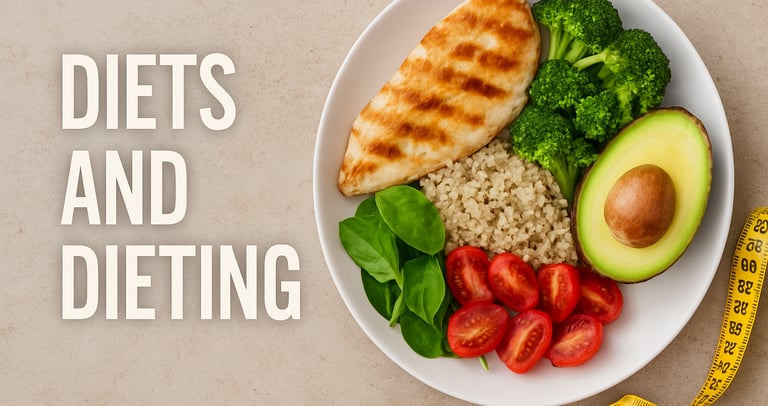Storysmith | • True Stories AND Creative Inspiration | Follow Me
Are you curious about the vast and sometimes bewildering world of diets, and what might be a good fit for different people. It's a fascinating topic, as eating is so central to our lives, health, and culture. There's certainly no one-size-fits-all answer, and what works wonderfully for one person might not suit another at all. Let's take a journey through some of the most prominent dietary approaches, exploring what they involve, and who might find them beneficial.
When we talk about "diets," we're often referring to structured eating plans designed for specific health goals, ethical considerations, or lifestyle choices. They can range from broad guidelines emphasizing certain food groups to very restrictive regimens.
One of the most widely praised and researched approaches is the Mediterranean Diet. This isn't a strict diet in the conventional sense, but rather an eating pattern inspired by the traditional cuisines of countries bordering the Mediterranean Sea, particularly Greece, Italy, and Spain. It champions an abundance of fresh fruits, vegetables, whole grains, legumes (like lentils and chickpeas), and nuts. Fish and seafood are consumed regularly, often a few times a week, while poultry and dairy are enjoyed in moderation. Red meat is typically limited to just a few times a month. The primary source of added fat is extra virgin olive oil. Wine is sometimes included in moderation with meals. This diet is celebrated for its strong links to heart health, reduced risk of chronic diseases, and increased longevity. It tends to suit individuals who enjoy cooking with fresh, seasonal ingredients, appreciate diverse flavors, and are looking for a sustainable, health-focused lifestyle rather than rapid weight loss. An example day might involve Greek yogurt with berries and nuts for breakfast, a large salad with grilled fish and olive oil dressing for lunch, and a dinner of lentil soup with whole-grain bread and a side of steamed vegetables.
Closely related to the Mediterranean approach are the eating patterns observed in the Blue Zones. These are regions around the world where people live significantly longer, healthier lives, often reaching 100 years old with remarkable vitality. While not a single diet, the common threads in their eating habits are striking: a predominantly plant-based diet, with legumes (beans, lentils, peas) forming a cornerstone. Whole grains, nuts, and locally grown vegetables and fruits are staples. Meat is consumed very sparingly, if at all, and dairy is minimal. They also often incorporate fermented foods and emphasize mindful eating, stopping when 80% full. This lifestyle-integrated approach is ideal for those seeking not just longevity, but a holistic sense of well-being, valuing community, natural movement, and a less hurried pace of life alongside their food choices.
Moving towards more specific food group restrictions, we encounter the Paleo Diet, often called the "Stone Age" or "caveman" diet. The premise here is to eat foods that were presumably available to our hunter-gatherer ancestors. This means focusing on lean meats, fish, fruits, vegetables, nuts, and seeds. Crucially, it excludes grains (like wheat, rice, corn), legumes (beans, peanuts, lentils), dairy products, refined sugar, and processed foods. Proponents suggest it can improve metabolic health, aid weight loss, and reduce inflammation. It might appeal to individuals looking for a "back to basics" approach to eating, or those who suspect sensitivities to grains or dairy. A typical meal might be grilled salmon with a large serving of roasted sweet potatoes and asparagus, or a mixed berry salad with almonds.
In stark contrast, the Ketogenic (Keto) Diet is a very low-carbohydrate, high-fat, and moderate-protein eating plan. The goal is to shift the body's metabolism from burning carbohydrates for fuel to burning fat, a state known as ketosis. This typically means consuming less than 50 grams of carbohydrates per day, sometimes as low as 20 grams. Foods include meats, fatty fish, eggs, cheese, butter, oils, nuts, and non-starchy vegetables. It has gained popularity for rapid weight loss and is medically used to manage epilepsy. However, its strictness can be challenging to maintain.It might best suit individuals who are highly disciplined and, for health reasons, are looking for a significant metabolic shift, often under professional guidance. An example meal could be scrambled eggs with avocado and bacon for breakfast, a large green salad with olive oil and cheese for lunch, and baked chicken with broccoli and butter for dinner.
Beyond specific food groups, some diets focus on timing or patterns of eating. Intermittent Fasting (IF) is a prime example. This isn't about what you eat, but when you eat. Popular methods include the 16/8 method (fasting for 16 hours and eating all meals within an 8-hour window each day) or the 5:2 method (eating normally for five days and significantly restricting calories on two non-consecutive days). IF is often adopted for weight management, metabolic health benefits, and simplifying daily eating routines. It can suit individuals who prefer larger meals within a condensed timeframe, or those who find calorie restriction on specific days easier than continuous daily counting. It's more of an eating schedule that can be combined with various food choices.
Finally, we have the broad category of Plant-Based Diets, which include vegetarian and vegan approaches. A Vegetarian Diet excludes meat, poultry, and fish, but may include dairy and eggs (lacto-ovo vegetarian). A Vegan Diet is stricter, excluding all animal products, including meat, fish, dairy, eggs, and often honey. These diets are often chosen for ethical reasons (animal welfare), environmental concerns, or perceived health benefits like lower risk of heart disease and type 2 diabetes. They suit individuals with strong ethical convictions or those seeking to maximize their intake of plant foods. Careful planning is essential to ensure adequate intake of nutrients like Vitamin B12 (especially for vegans), iron, and omega-3 fatty acids. A vegetarian meal might be a cheese and vegetable omelet, while a vegan meal could be a hearty lentil and vegetable curry with brown rice.
In conclusion, the world of diets is incredibly diverse, offering a spectrum of choices from flexible lifestyle patterns to highly structured regimens. The "best" diet is ultimately the one that aligns with an individual's health goals, lifestyle, ethical beliefs, and, crucially, one they can sustain long-term. It's always wise to consider personal health conditions and, if possible, consult with a healthcare professional or registered dietitian before making significant dietary changes.
Understanding and Combating Diet-Related Lethargy
It's a common experience for individuals embarking on a new diet, particularly those involving calorie restriction or significant changes in macronutrient intake, to feel a sense of lethargy or fatigue. This "diet fatigue" can be disheartening, but it's often a temporary phase as the body adjusts to new eating patterns and energy levels.
Several factors can contribute to this dip in energy. The most direct cause is often a caloric deficit itself; when you consume fewer calories than your body is used to, it naturally tries to conserve energy, leading to feelings of sluggishness. Rapid or extreme calorie restriction can exacerbate this. Another common culprit is blood sugar fluctuations. If a diet involves cutting out certain carbohydrates, or if meals are skipped, blood sugar levels can drop, leading to energy crashes. Additionally, nutrient deficiencies can play a role; restrictive diets might inadvertently limit essential vitamins and minerals like iron, magnesium, or B vitamins, all crucial for energy production. Dehydration, often overlooked, can also contribute to feelings of tiredness. Lastly, the mental and emotional toll of strict dieting, the constant focus on food, and the potential for stress can also manifest as fatigue.
Fortunately, there are several strategies to help combat diet-related lethargy and maintain energy levels:
First and foremost, ensure your diet is nutrient-dense. Even with a calorie deficit, prioritize whole, unprocessed foods like lean proteins, plenty of fruits and vegetables, and complex carbohydrates (from whole grains and legumes). These provide sustained energy and essential micronutrients without excess calories. Eating at regular intervals, even smaller, more frequent meals, can help stabilize blood sugar and prevent energy dips.
Stay adequately hydrated. Drinking plenty of water throughout the day is crucial, as even mild dehydration can lead to fatigue. Carry a water bottle as a reminder.
Prioritize quality sleep. Dieting can sometimes affect sleep patterns, but sufficient rest is vital for energy levels. Aim for 7-9 hours of quality sleep per night, and establish a consistent sleep schedule. Avoid caffeine and heavy meals close to bedtime.
Incorporate appropriate physical activity. While it might seem counterintuitive when feeling tired, regular, moderate exercise can actually boost energy levels and improve mood. Start slowly with walks and gradually increase intensity as your body adapts. Avoid overtraining, especially when in a calorie deficit, as this can worsen fatigue.
Finally, listen to your body and be patient. If lethargy is severe or persistent, or accompanied by other concerning symptoms, it's always wise to consult with a healthcare professional or a registered dietitian. They can help identify any underlying issues, ensure your diet is balanced, and provide personalized guidance to help you achieve your goals without compromising your well-being.
In conclusion, the world of diets is incredibly diverse, offering a spectrum of choices from flexible lifestyle patterns to highly structured regimens. The "best" diet is ultimately the one that aligns with an individual's health goals, lifestyle, ethical beliefs, and, crucially, one they can sustain long-term. It's always wise to consider personal health conditions and, if possible, consult with a healthcare professional or registered dietitian before making significant dietary changes.



